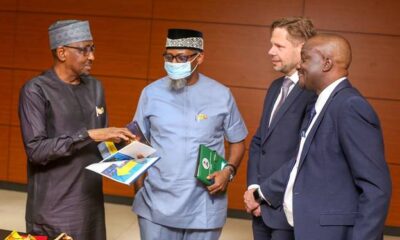Business
Tomato Scarcity: Don Wants Research On Heat-Tolerant Varieties
A lecturer in the Agronomy Department, Ahmadu Bello University (ABU) Zaria, Prof. Bashir Ahmad-Babaji has advocated for research on heat-tolerant tomato varieties, to reduce the scarcity of the commodity in Nigeria.
Ahmad-Babaji, a Professor of Horticulture at the Institute for Agricultural Research (IAR) ABU, expressed the viewpoint in an interview with newsmen in Zaria, Kaduna State, recently.
According to The Tide source, Nigeria usually experiences acute shortage of tomato at the beginning of every rainy season, because tomato cultivated during the dry season could not survive the rainy season.
The don said that tomato was a cool-loving and non heat-tolerant crop, hence, the need to intensify efforts toward coming up with new varieties that were heat-tolerant.
“One of the ways to address this peculiar problem is to develop heat-tolerant tomato varieties; already, our scientists have done something on that.
“Initially, IAR had the mandate of genetic improvement on tomato; during that time, we have done a good number of things by developing some few tomato varieties.
“But when the mandate was transferred to the National Horticulture Research Institute, all the genetics works have been transferred to that place,” he said.
Ahmad-Babaji said that in an effort to alleviate the menace, IAR had developed UC82, a little bit heat-tolerant variety, which had been in the market.
The university teacher observed that for Nigeria to effectively tackle the problem there was the need to address problems arising from pest and diseases, humidity and non-heat tolerant varieties.
He, however, said that as an Agric Faculty, the Department of Plant Science was also doing other things, but not under IAR.
“Some students and scientists are also conducting some researches to come up with heat-tolerant tomato varieties.
“Last year, there was a student who graduated from the department, who had screened some varieties which have heat-tolerant ability; some of these were imported.
“From my discussion with him, the student wanted to continue with his PhD in that line, maybe in some few years to come, we will be able to come up with heat-tolerant varieties.”
According to the professor, in the next three to four years, farmers should expect new heat-tolerant varieties that will adapt to the Nigerian climate.
He said that when such move was actualised, farmers would be able to cultivate tomato all-year round without any interference.
Ahmad-Babaji identified ice-rain and heavy rainfall as other problems directly affecting tomato cultivation during the rainy season.
He said that when tomato starts fruiting and ice-rainfall strikes on it, it would destroy the phil and break the fruits, noting that farmers do not usually pray for such to happen.
Business
Insecurity, Poor Power Supply Hamper Business Activities – Survey

Business in Nigeria remain under pressure as a result of insecurity and erratic power supply which continue to stifle productivity in the country.
This is even as new data from the Central Bank of Nigeria (CBN) indicate sustained improvements in economic activity.
This was the response of businesses in the CBN’s October 2025 Business Expectations Survey (BES) and the Purchasing Managers’ Index (PMI) report.
While the PMI showed that economic activity expanded for the 11th consecutive month, the BES revealed that businesses are still grappling with crippling operational constraints that threaten to reverse recent macroeconomic gains.
According to the BES conducted between October 6 and 10, firms identified insecurity (71.8 points) as the most critical challenge affecting operations nationwide. This was closely followed by insufficient power supply (70.9 points), multiple taxation (70.2 points), high interest rates (68.4 points) and financial constraints (65.6 points). Analysts say these constraints underscore the depth of structural weaknesses confronting Nigeria’s private sector.
Despite these challenges, the survey reported a rise in business optimism. The Business Confidence Index increased to 38.5 points in October from 31.5 in September. Firms also projected confidence levels to reach 45.6 points in November, with expectations of further improvement over the next three to six months.
However, sector analysts warn that the optimism remains fragile due to the lack of significant improvements in the operating environment.
The BES further showed a modest rise in capacity utilisation from 60.4% in September to 62.0% in October, suggesting that businesses have yet to deploy their productive capacity amid ongoing disruptions fully.
In contrast to the structural constraints highlighted in the BES, the PMI report indicated strengthening economic momentum. The composite PMI rose to 55.4 points, reflecting expansion across major components such as output, new orders, employment, inventories, and supplier delivery times.
A sectoral breakdown showed that the agriculture sector recorded the most substantial improvement, with its PMI climbing to 57.5 points, marking 15 consecutive months of expansion. The services sector also expanded for the ninth straight month to 55.6 points, while the industry sector rose to 54.2 points, the highest in more than a year.
The CBN attributed the positive trends to improvements in the broader macroeconomic landscape, including declining inflation, which eased from 24.5% in January to 18.0% in September, and the year-to-date appreciation of the naira across both official and parallel markets.
The BES showed that the North-East posted the highest business confidence at 56.1 points, while the South-South recorded the lowest at 23.3 points, a trend linked to declining activity in oil-producing communities.
Business
FG Set To Launch Free National Financial Literacy Training For 100,000 Youths,
The Federal Government will on Tuesday, November 25, officially unveil a strategic programme for a free nationwide training of over 100,000 youth on financial literacy.
The Federal Ministry of Youth Development will launch the programme in collaboration with Investonaire Academy. Tagged, the “Financial Literacy, Investment, and Wealth Creation programme.”
The flagship initiative is designed to equip young Nigerians with essential financial skills, investment knowledge, and digital competencies for sustainable wealth creation.
A statement signed by the Director, Press and Public Relations, Federal Ministry of Youth Development, Omolara Esan, and made available to newsmen, confirmed that the launch of the programme, to be held in Abuja, would promote nationwide participation.
It added that the launch would bring together senior government officials, development partners, private sector leaders, and youth representatives to explore innovative approaches for improving financial capability and strengthening the economic prospects of young Nigerians.
Minister of Youth Development, Comrade Ayodele Olawande, would serve as the chief host, while the Minister of Women Affairs, Hajiya Imaan Sulaiman-Ibrahim, would grace the event as the Special Guest of Honour.
Also expected are representatives of key government institutions and private sector partners, including Dr Enefola Odiba, International Programme Director, Investonaire Academy, and Mr. Bashir Nurmohamed, Chief Executive Officer, Hantec Markets
The statement reads, “A major highlight of the event will be the unveiling of a free national financial literacy training programme targeting over 100,000 youths annually. The programme will be powered by a state-of-the-art Learning Management System (LMS) designed to enhance financial intelligence, investment capacity, and entrepreneurial readiness among Nigerian youth.
Lady Godknows Ogbulu
Business
‘Entrepreneurs, Not Foreign Aid Drive Nigeria’s Growth’

The chairman of the United Bank for Africa, Tony Elumelu, says Nigeria’s economic transformation will be driven by entrepreneurs, not government handouts or foreign assistance.
Elumelu, who spoke at the Grow Nigeria Conference 2.0 and themed ‘Empowering Nigeria’s Entrepreneurs: Building Institutions That Last’, in Lagos, Monday, said the nation’s future is already being shaped by business owners who refuse to settle for mediocrity.
Elumelu, who is also the founder of the Tony Elumelu Foundation, described Nigeria as an entrepreneurial nation but stressed the need to build institutions that can stand the test of time.
“Starting businesses is good. Sustaining them is critical, and that’s how we transform this economy,” he said.
He noted that many promising ideas fail because the systems and support structures necessary for growth are absent.
According to him, Nigeria’s renewal must come from the private sector, backed by strong governance frameworks and proper succession planning.
“Nigeria will not be built by government handouts or foreign aid. Government’s role is critical, but Nigeria will be built by entrepreneurs — by you, building businesses that create jobs, hope, and prosperity from the ground up,” he said.
Elumelu, however, emphasized that entrepreneurs cannot succeed in isolation.
“You need frameworks — clear governance, succession planning, and relentless focus on value. We need the right environment. We need a Nigeria where policies are predictable, infrastructure works, and financing is truly accessible,” he said.
He called for stronger alignment between public and private sector efforts, warning that progress would remain limited if institutions work independently rather than collaboratively.
Elumelu commended the Director-General of the Small and Medium Enterprises Development Agency of Nigeria (SMEDAN), Charles Odii, for ongoing reforms within the agency.
He further lauded President Bola Tinubu for appointing young Nigerians to lead key institutions and for prioritizing youth entrepreneurship.
“Let us cut the bureaucracy. Make finance and opportunity real, not theoretical. Let’s help Nigeria’s entrepreneurs move from surviving to winning.
“Every job we create fights insecurity. Every thriving business increases our tax base and accelerates prosperity for all,” Elumelu added.
-

 News1 day ago
News1 day agoFG Suspends Planned 15% Import Duty On PMS, Diesel
-
Sports1 day ago
Bisi Open Championship: Coach Attributes Victory To Hard Work
-

 Politics1 day ago
Politics1 day agoOsun 2026: Why Adeleke Is Searching For Platform To Contest Poll – PDP Chieftain
-
News24 hours ago
Tinubu Mourns Newswatch Co-Founder, Agbese
-
Nation3 days ago
HMSPR Oil, NCDMB, NIMASA, Stakeholders Praise Tamrose for Phenomenal Growth, Exemplary Local Content Capacity Building and Financial Fidelity …Pledge Increased Financial and Institutional Support for Indigenous Companies
-
Business1 day ago
2,000 Women Entrepreneurs Set To Receive PINL Business Support For Host Communities
-
News1 day ago
Nigeria Ready For 32.2 % Emission Reduction By 2035 – NCCC D-G
-
Sports1 day ago
Barau Beat Rangers To Move Out Of Relegation Zone

